| Srl | Item |
| 1 |
ID:
151894
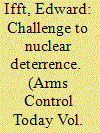

|
|
|
|
|
| Summary/Abstract |
Seventy years into the nuclear age, something revolutionary is about to occur. It is likely that, within the next year or two, a majority of the world’s countries will declare in a legally binding document that they no longer accept nuclear deterrence as a valid concept in international relations.
|
|
|
|
|
|
|
|
|
|
|
|
|
|
|
|
| 2 |
ID:
151588
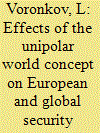

|
|
|
|
|
| Summary/Abstract |
BEHIND THE POLICY of Western countries and their allies toward Russia in the Ukrainian crisis is a long-term strategy adopted by key Western powers, and the Ukrainian conflict is just one manifestation of this strategy. Claims by the United States that it is the world leader, far from raising any objections from its allies, are supported by them in every way.
|
|
|
|
|
|
|
|
|
|
|
|
|
|
|
|
| 3 |
ID:
126251
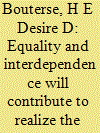

|
|
|
| 4 |
ID:
124413
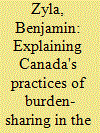

|
|
|
|
|
| Publication |
2013.
|
| Summary/Abstract |
While Canadian burden-sharing practices within NATO in the 1990s are well documented, the data in the literature raise two central questions: (1) was the practice of Canadian burden-sharing a one-time event, or was it part of a larger pattern of practices? and (2) what factors motivated Canada to shoulder the burden to the extent that it did? This article studies the extent of Canada's burden-sharing practices in the context of the International Security Assistance Force (ISAF) mission in Afghanistan. The article makes two arguments: first, Canada's commitment to NATO continued to be strong post-9/11; second, Canada's practices of sharing Atlantic burdens can be explained by its adherence to the norm of "external responsibility," which guided its foreign policy by appealing to Canada's humanitarian responsibilities to contribute at an extraordinary level to the promotion and maintenance of international peace and security.
|
|
|
|
|
|
|
|
|
|
|
|
|
|
|
|
| 5 |
ID:
129038
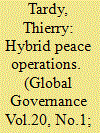

|
|
|
|
|
| Publication |
2014.
|
| Summary/Abstract |
Hybridity is the new term for multidimensional, modular, and multiactor peace operations. Hybrid peace operations bring together several institutions that to an extent cooperate in a joint endeavor. This article aims at unpacking the concept of hybridity by looking at its rationale and challenges. It first examines the typology of peace operations and analyzes the meaning of hybridity. It then looks at why international organizations have hybridized their conflict management policies and contends that further integration is the way forward for legitimacy and efficacy reasons, despite the difficulties encountered by existing hybrid missions. Finally, the article looks at some of the challenges of an increasing integration of institutional actors within peace operations. While integration is a response to the evolution of conflict management needs, it also carries risks ranging from interinstitutional competition to issues of accountability and ownership as well as impacts on the coherence of the global maintenance of international peace and security.
|
|
|
|
|
|
|
|
|
|
|
|
|
|
|
|
| 6 |
ID:
133567
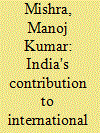

|
|
|
|
|
| Publication |
2014.
|
| Summary/Abstract |
Manoj Kumar Mishra argues that the concept of human security provides a broader framework for a realistic assessment of the contribution of nation-states to international peace and security than human rights. He assesses India's foreign policy as well as its contribution to international peace and security through UN peacekeeping operations and its role in addressing the structural inequalities in the world economic order through the human security perspective
|
|
|
|
|
|
|
|
|
|
|
|
|
|
|
|
| 7 |
ID:
155642
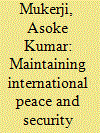

|
|
|
| 8 |
ID:
145414
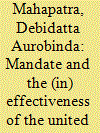

|
|
|
|
|
| Summary/Abstract |
The article examines the (in)effectiveness of the United Nations Security Council (UNSC) as an enforcer of peace and security in the post–Cold War global order and teases out the tensions between the mandate and its enforcement. Through an examination of the cases of Syria and Mali and the related UNSC resolutions, the article demonstrates that the council’s role is primarily guided by the geopolitical visions and interests of its veto-wielding permanent members (P5). The action or inaction of the council depends on whether a particular situation is tangential or core to the concern of a permanent member or a group of members. Geopolitical visions guiding the interests of the permanent members dominate the UNSC-mandated concerns of international peace and security. While the conflict situations in Syria and Mali posed similar problems, the council emerged largely effective in the later and ineffective in the former owing to the clash of geopolitical visions. In the case of Syria the clash of visions eclipsed the global concerns for peace, while in the case of Mali the absence of the clash enabled the council to enforce peace.
|
|
|
|
|
|
|
|
|
|
|
|
|
|
|
|
| 9 |
ID:
107683
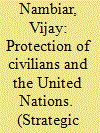

|
|
|
| 10 |
ID:
079875
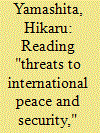

|
|
|
|
|
| Publication |
2007.
|
| Summary/Abstract |
In the United Nations Charter the notion of the "threat to international peace and security" is designed to play a key enabling role in framing its collective security functions. Taking a 60-year period from the UN's founding, this article examines how the UN Security Council has developed the notion of the "threat to international peace and security" through its resolutions, and what this evolution might mean for the notion of collective security and the Council's role in it.
|
|
|
|
|
|
|
|
|
|
|
|
|
|
|
|
| 11 |
ID:
178966
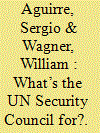

|
|
|
|
|
| Summary/Abstract |
To be worthy of its name, the Security Council will need to engage more deliberately and resolutely on new threats involving cyber and emerging technology, climate and the environment, and global health.
|
|
|
|
|
|
|
|
|
|
|
|
|
|
|
|